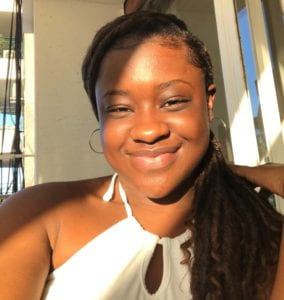Bio
 Born and raised in Queens, New York, Najah Aldridge is a rising senior at NYU’s College of Arts and Science. She is currently majoring in global public health and sociology with minors in dance and Spanish. Focusing on these fields, she aspires to create her own grassroots organization that promotes access to dance for all afro descendants. Across campus, she holds mentorship and executive positions in the Academic Achievement Program, Womxn of Excellence Strength and Tenacity, Afroseke, and NYU’s Black Women’s Health Collective. This year, she has been awarded for her services at Bridging the Gap for Our Youth and Ede Youth where she assisted the non profit organizations in providing resources for marginalized youth. Her collective experience in social research at NYU Steinhardt’s RISE lab and Instituto de Efectividad Clinica y Sanitaria in Argentina prepared her for her summer work as a fellow at The Clemente. There she will highlight the ways in which The Clemente effectively intertwines the arts and public health measures to cultivate, present, and preserve Puerto Rican / Latinx culture, in hopes to create a similar institution of her own.
Born and raised in Queens, New York, Najah Aldridge is a rising senior at NYU’s College of Arts and Science. She is currently majoring in global public health and sociology with minors in dance and Spanish. Focusing on these fields, she aspires to create her own grassroots organization that promotes access to dance for all afro descendants. Across campus, she holds mentorship and executive positions in the Academic Achievement Program, Womxn of Excellence Strength and Tenacity, Afroseke, and NYU’s Black Women’s Health Collective. This year, she has been awarded for her services at Bridging the Gap for Our Youth and Ede Youth where she assisted the non profit organizations in providing resources for marginalized youth. Her collective experience in social research at NYU Steinhardt’s RISE lab and Instituto de Efectividad Clinica y Sanitaria in Argentina prepared her for her summer work as a fellow at The Clemente. There she will highlight the ways in which The Clemente effectively intertwines the arts and public health measures to cultivate, present, and preserve Puerto Rican / Latinx culture, in hopes to create a similar institution of her own.
Project Summary
During the Gallatin Global Fellowship in Urban Practice, I partnered with The Clemente to answer, “How did The Clemente build and promote a foundation that values both the arts and preserves culture?” This question led to supplementary questions like how did The Clemente plan events, manage their finances, and take consequential steps that allowed the organization to establish itself in the Lower East Side of New York? How did The Clemente advertise and grow its platform in its first five years to engage other audiences, communities, and organizations? What images and representations of Puerto Rican or Latinx culture are elevated throughout The Clemente? Lastly, how do artists in residence at The Clemente or people that have been at The Clemente from its beginning talk about The Clemente’s growth over time? I aimed to understand the formative formulation of The Clemente that allowed them to be the renowned institution in Loisaida that they are today.
In this partnership, I also worked with The Clemente to write blog posts about the exhibits presented in the gallery. These posts are intended to inspire and educate the public on the events happening at The Clemente and how they aligned with the values of the organization showing their works. I also was a part of the operations for the International Puppet Fringe Festival. My tasks included guiding the participants and public around the building, and monitoring and organizing the production and selling of tickets each day. In order to coordinate my research, I conducted semi-structured interviews in person and virtually with the artists in residence and staff present at The Clemente closer to its founding in 1993. These interviews resulted in a deeper and complex understanding of Puerto Rican culture specifically its multilayered identity in the Caribbean, also a conclusion of requests by artists in residence and staff to elevate the outreach of The Clemente. My blog posts are also in the process of being published by Latinx Spaces and The Latinx Project.
Mission Statement
This summer, I will be working with The Clemente, evaluating the ways in which they build and promote a center that values both the arts and preserves culture. I will focus on the first five years of formulation to analyze the processes that enabled them to become a brick-and-mortar organization.
I aim to learn about their foundational community-building procedures based on their definition of art and Puerto Rican and Latinx culture. I hope that this experience will portray how the urban landscape affects the ways that organizations, that promote the arts and culture of marginalized communities, can thrive and provide a space for the community. My academic objective is to formulate a way to intertwine the arts (specifically dance) and public health measures. Under The Clemente, will be given the opportunity to receive first-hand experience from an institution that comprehensively fosters the interconnection between the arts and public health. Ultimately, I will be utilizing these effective strategies to create a non-profit organization of my own that uplifts and recognizes the importance of Black dance and Black dance education.
The Gallatin Global Fellowship in Urban Practice provides funding of up to $5,000 and support for 6-10 advanced BA and MA students to pursue extended, community-engaged, practice-based research projects in partnership with urban social justice organizations.
